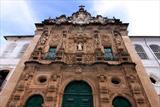The plan had originally been to spend 4 days in Salvador before rushing up north to get the last of the January wind for kite-surfing. The damned delayed flight on the 19th cut one day off though, and then I was zombified the next day, so unfortunately I only really got 2 days to relax and take in the place. As I was to find, this was nowhere near enough time to even get a TASTE of the place...

Salvador centro historico

Beautiful church...
Armed with my SLR and pocket camera it was time to see the REAL Salvador, so I took a local bus in to the historical centre called Pelourinho. Brazil's cities were, of course, initially built with the hands of 100,000s slaves captured from the west coast of Africa in places like Angola and Nigeria, etc. Being the first capital of the new Portuguese empire, Salvador was ground-zero for trafficking these unfortunate souls, so there are many reminders of this past, let alone the fact that the majority of Salvador's population are of African decent.
The name Pelourinho itself is in reference to a "pelourinho" post used to tie up rebellious slaves, from which they would be whipped mercilessly. Wandering around the cobblestone roads of the historical centre you can even see the hill where this post would have been placed, for all to see. It's ironic that the name has stuck, but exists as a reminder I guess.

Baiana lady serving...
Pelourinho is a real gem. Amidst the labyrinth of small cobblestone streets, the place surprises you again and again with beautifully decorated 16th century churches and government buildings (now converted into museums).
The people really make the place what it is though, and the African heritage is strong and proudly interwoven into everyday life. Whether it's the Bahian ladies dressed in the traditional garb serving the delicious Acarajé (a bean-dough, fried, cut open and then stuffed with shrimps and spices), the guys performing Capoeira in the street (the famous martial art/dance form with origins in Angola), the rastas, the guys coming up to you and saying "Respeito" ("Respect") or the Samba music that abounds down many streets. The place is alive, and really really cool.
It's not particularly safe though, and I remember swivelling around after taking the photo above left only to see a bloke heading straight for me. Once our eyes met though he side-tracked, and we both gave each other dirty looks for the next 30 seconds 
Always be on guard in Brazillian cities. At one point I wandered down a street, not noticing it was becoming distinctly less touristy, and then, finding it was a dead-end, I turned around but not before some kids wearing baseball caps popped up around the corner about 5 metres from me, hip-hop music pumping out of their car, shouting "Oi Amigo" while walking aggressively toward me. I just gave em the thumbs up, and headed on outa there pronto.

Superb tiling in C16th...
I wandered into a few churches which were founded by the Jesuits. The vast wealth and power these people must have had is clearly evident in the detailing of the ceiling paintings depicted settler life, or in the size of the rooms and interior decoration.

Tunnels connect...
Many of the churches are connected by a series of underground tunnels that crisscross the centre of Salvador. I wandered down one of these and it was a rather spooky affair. The tunnels were designed primarily for defence in case of attack. The Portuguese made a lot of enemies!
I came across another church that had a large "Ruby-Stone" carving of Jesus that was astonishingly realistic. All the more impressive when you find out that it was carved by a slave. The slave's name was O'Cabra. I tell ya the Irish get everywhere!

Olodum (as worn by...
Suddenly out of nowhere I heard a HUGE noise. Almost like machine-gun fire, but then realised it was the sound of several drums being played at an exceedingly rapid pace. The famous band "Olodum" (well "famous" as in Michael Jackson featured them in his video "They don't care about us") was playing a free session in the street, so I marched off pronto and got some great shots of the kids in action. Olodum was formed to enrich the lives of impoverished kids who would otherwise have nothing to do except petty crime. It gives them a strong identity and closer ties to their African roots.
I had an interesting chat with a local guy (while buying my obligatory "Olodum" tshirt  ) who, when I mentioned the "indigenous people" of Brazil (meaning the original natives) told me that he thought the real indigenous were the black people. I guess they deserve that moniker as much as the natives as they were put here against their will and ties with their homeland were severed over 500 years ago.
) who, when I mentioned the "indigenous people" of Brazil (meaning the original natives) told me that he thought the real indigenous were the black people. I guess they deserve that moniker as much as the natives as they were put here against their will and ties with their homeland were severed over 500 years ago.
Alas, the day was over before it even began and I had a pre-booked flight leaving at 5am for Fortaleza (meaning I would have to get up at 2am), so I had to call it a day and hope to return to Salvador someday!